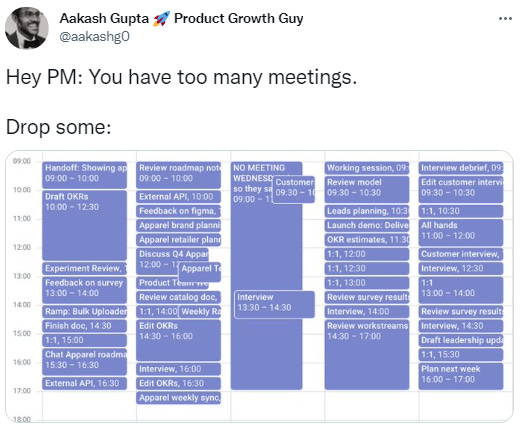M&Ms: Calendar Tips
Hey Team,
My friend Aakash recently tweeted a calendar screenshot that gave me anxiety.
I get anxious because I was spending 50+ hours a week on meetings when I worked a big corporate job last year. And get this, on many of those meetings I sat in on, I maybe was needed for a few minutes at most.
At that time last year, I finally internalized that I was meant for more than just sitting in on meetings; you are too.
At the very least, it's obvious that the world has never had more problems than it has right now. And very few of those problems will be solved in meetings. It will take action and doing. In many ways, we are doing the world a favor if we free ourselves from the grip of endless meetings. Even if we just use our free time to think, that is a far better use of time than passively listening in on a large group meeting and burning time away.
I understand that not everyone despises this many meetings as much as I do. But, to me, that's only because they aren't valuing their finite time on this earth properly.
One framework I have found that helps value time right is to do what Naval suggests. Naval says to set an aspirational hourly rate. You should do this even if you have no intention of becoming rich; it's hard to put a price on your time, which is why it's worth a lot.
"Fast-forward to your wealthy self and pick an intermediate hourly rate. Before I had any real money and you could hire me, I set an aspirational rate of $5,000 an hour.
...
I would argue with girlfriends, "I don't do that. That's not a problem that I solve." I still argue that today with my wife and with my mother, when she hands me little to-do's. I say, "I would rather hire you an assistant." This was true even when I didn't have money."
Would you sit in on all those meetings if your time was worth at least $5k an hour? Probably not.
With this framework in mind and a year of hindsight and deep thought about what worked and what didn’t on my side, I can give you some tips that might help you if your calendar looks like the one Aakash shared. And to be clear, Aakash has some great tips himself in the thread on how PMs can manage their time better. And Aakash also runs a wonderful newsletter that is jam-packed with value for anyone in tech.
The first thing to note is that calendar does one thing right. Specifically, on Thursdays, it sets up 1-on-1s as back-to-back. But it does not do that for all of the 1-on-1s the rest of the days, and it should.
So the first tip is to stagger your 1-on-1s back to back.
Stagger 1-on-1s this way because you can then take all of them on a long walk, drink a nice jug of coffee and get some exercise in. Meetings aren't too bad when they are a byproduct of something you should be doing anyway, like exercise. You might be hesitant at first. But trust me, my reports and even my managers used to love talking to me while I was on a walk because the conversation flowed better, and my thinking was clearer.
The next tip is to try and dump all of your frequent recurring group meetings; if you can't dump them, then avoid them. And if you can't avoid them, show up for only part of it. This is how you can free up the vast majority of your calendar. And the more frequent recurring group meetings are, the more skeptically you should view them, e.g., weekly recurring meetings are usually much less useful than monthly or quarterly.
I recognize this may sound crazy to many. And I know what you are thinking. "Won't I miss out on important stuff?" And the answer is very likely no. If you have a recurring group meeting and you miss it, chances are high that if you were actually needed, someone would send you the meeting notes or a quick ping with what is needed from you. But far more likely, no one will even notice or care. If no one pings you, this is a huge sign that the meeting is not valuable to you.
I started doing this simply because I had 2-3 overlapping meetings on top of each other at the same time slot before I quit last year. I was shocked and only discovered by not attending that I wasn't even needed in many of those recurring meetings. Even though they had added me with the expectation of being there when I simply did not attend, I still somehow got all the information but in a more digestible way.
You might say, "Okay, but I need to speak up at my recurring group meeting; I need to give an update; I cannot avoid it." Yes, you can still avoid the majority of it. How? Go to the meeting and give your update but let the person in charge of the meeting know you'll be leaving in 15 minutes. If no one is in charge, drop this in the chat, "sorry, I have a hard stop at this time; thank you all, I will catch you later." People will just assume you've got important stuff going on and leave you alone.
Again you aim to eliminate all frequent recurring group meetings. You do this because they are an insidious obligation with far too little return on the time they take from you. Yes, even things like standups you should aim to get rid of. You should push your teams to move to an asynchronous process for standup updates. Once people are used to working this way, they'll thank you for doing this. Everyone can drop an update on slack or whatever communication tool your Team uses. Many of my teams moved to this way of doing standups, even pre-covid and in the office days, and everything was great; people could ping each other and chat for a few minutes if there were questions, and there was no need to tie up the whole Team, even if it was for a short meeting.
Recurring group meetings are stubborn things that rarely drop off on their own. If you can't do any of the above, at least push people to do regular audits on if they are useful.
The next tip I learned from a marketing executive at Jet is to block out large contiguous blocks of your own time from your calendar. Even though Jet was a startup, people still looked at your calendar, saw a free time slot, and dropped a meeting in. But they can't drop a meeting in if you block out 3 or 4 hours for you to do your deep work. This is a common tip, so you need to be careful; if you book this time slot at the same time every day, someone will figure out your trick and try to set up meetings over this time. This is how the time slot meant for deep work gets ruined for many. Instead, vary it a little bit and give it unique names.
Please don't feel guilty about this; remember, your time is valuable no one has a right to waste it with meetings that could be an email or a slack message.
So many people in the corporate world will not hesitate to waste your time. Many won't be valuing time like you. An organization's timelines are measured in months, quarters, and years. But you are not measuring your time like that; you can't afford to burn months and quarters. And now your personal hourly rate is too high for that.
Lastly, there are other tips, such as using a maker schedule with a free calendar for deep work some days with a packed calendar on other days. I recommend giving this older article by Paul Graham on this a read and a try.
But I also recommend treating the root cause of the modern day over-meetings. Treat time with the right amount of value it has.
Also, you do want to meet with all the humans on your Team from time to time. But let that be a not-so-frequent recurring meeting. And you can meet with folks anytime to shoot the shit or help with something, but just don't let it become an insidious commitment that's hard to shed.
A great PM I worked with used to say, "if there is nothing else, I will just give everyone the rest of the time back." Take your own time back.
Three Tweets I enjoyed this week.
There was some text exchanges made public this week as part of Twitter and Elon Musk’s lawsuit.
In one exchange Elon pinged Larry Ellison
While some are criticizing Elon for the way he and his circle text, I have a different takeaway here. One that is similar to Dare in the tweet.
We should all strive to build relationships like that in our lives. People that trust us and that we trust so much we can just write a check or they can just write a check when needed.
It’s good and enjoyable business, it is a huge reason these people are so successful and remain successful.
This is a great thread on how the realestate market has evolved since the pandemic.
While some of the conclusions may be a little overblown, major differences exist in the overheated pandemic markets of Texas, Arizona, and Florida to those on the east coast.
It is also notable that those same overheated markets are experiencing far higher inflation rates than the markets that suffered the most during the pandemic.
Any coffee fan will love the results of this study.
Two Memes from this week:
This one is tough because I started slowly graying out at 30. The other messed up thing about this is that my 7 year old draws and writes in a similar style.
A sobering political cartoon that is from before I was born.
Thank you for reading the 74th edition of this newsletter.
-Louie
P.S. you can reply directly to this email it will get to me and I will read it.











Great breakdown!